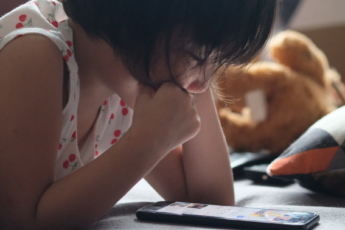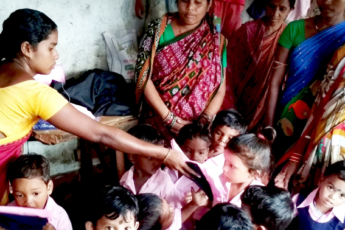Why Learning Through Play Is Important
The fact that becoming literate opens doors and avenues previously unexplored is known to all. It is the ultimate goal for all parents and teachers, something they spend their lives and careers striving to achieve. Learning to be literate is more than simply having knowledge of the alphabet and the language, however. Literacy also involves developing cognitive skills, preferably during the preschool and kindergarten years. That’s why so much of early education is play alongside learning. Research supports the ‘learning through play’ method, with esteemed psychologist Lev Vygotsky, in his article, Play And Its Role In The Mental Development Of The Child, examining the different components of play and the way they affect a little learner’s just-developing mental functions, and thus concluding that play might not be the primary activity, but, in a certain way, it is the main reason for a child’s development in the preschool years.*At the time Vygotsky conducted his research, in Russia, formal schooling started around the age of 7. So it is fair to include both preschoolers and kindergarteners in his findings.**Vygotsky only looked at play in terms of role-play (kids putting themselves in imaginary situations, kids taking on and acting out roles, and following a set of rules determined by that role).If you need more reasons to convince you learning through play is essential, read on…1) Play Develops Their Senses: An educational game succeeds in stimulating a young learner’s senses the way simple learning cannot. Using props and educational toys that encourage kids to use multiple senses, including tactile ones, enhances their retention and learning.
That’s why so much of early education is play alongside learning. Research supports the ‘learning through play’ method, with esteemed psychologist Lev Vygotsky, in his article, Play And Its Role In The Mental Development Of The Child, examining the different components of play and the way they affect a little learner’s just-developing mental functions, and thus concluding that play might not be the primary activity, but, in a certain way, it is the main reason for a child’s development in the preschool years.*At the time Vygotsky conducted his research, in Russia, formal schooling started around the age of 7. So it is fair to include both preschoolers and kindergarteners in his findings.**Vygotsky only looked at play in terms of role-play (kids putting themselves in imaginary situations, kids taking on and acting out roles, and following a set of rules determined by that role).If you need more reasons to convince you learning through play is essential, read on…1) Play Develops Their Senses: An educational game succeeds in stimulating a young learner’s senses the way simple learning cannot. Using props and educational toys that encourage kids to use multiple senses, including tactile ones, enhances their retention and learning. 2) Play Helps Power Their Mind: Imagine a large battery which you can plug, and voila, your kids’ brains are that much smarter. A learning game is exactly that battery, sparking more engagement and learning in a beginner learner’s mind. Not only are their cognitive skills much more developed, they also exhibit signs of critical thinking, and can understand cause and effect.3) Learning Games Prompt Physical Play: Not every educational game has users sit passively to learn; the ones catering to a younger audience almost always incorporate an element of kinesthetic learning-whether it is dancing, or singing, or simply getting up and moving around. Boosting large and small motor skills, these games are perfect for added reinforcement of regular learning.4) Games Boost Creativity: When kids play a learning game, their minds are almost always actively engaged. Whether it is the animated gameplay or the engaging activities in each game, young learners can explore and expand their minds to a greater extent.
2) Play Helps Power Their Mind: Imagine a large battery which you can plug, and voila, your kids’ brains are that much smarter. A learning game is exactly that battery, sparking more engagement and learning in a beginner learner’s mind. Not only are their cognitive skills much more developed, they also exhibit signs of critical thinking, and can understand cause and effect.3) Learning Games Prompt Physical Play: Not every educational game has users sit passively to learn; the ones catering to a younger audience almost always incorporate an element of kinesthetic learning-whether it is dancing, or singing, or simply getting up and moving around. Boosting large and small motor skills, these games are perfect for added reinforcement of regular learning.4) Games Boost Creativity: When kids play a learning game, their minds are almost always actively engaged. Whether it is the animated gameplay or the engaging activities in each game, young learners can explore and expand their minds to a greater extent.
 Playing, Learning, And The World: Governments around the world have started to recognise and acknowledge the importance of learning through play, and are taking steps (strides, in some countries), to incorporate a ‘play’ element for their young.
Playing, Learning, And The World: Governments around the world have started to recognise and acknowledge the importance of learning through play, and are taking steps (strides, in some countries), to incorporate a ‘play’ element for their young.
 That’s why so much of early education is play alongside learning. Research supports the ‘learning through play’ method, with esteemed psychologist Lev Vygotsky, in his article, Play And Its Role In The Mental Development Of The Child, examining the different components of play and the way they affect a little learner’s just-developing mental functions, and thus concluding that play might not be the primary activity, but, in a certain way, it is the main reason for a child’s development in the preschool years.*At the time Vygotsky conducted his research, in Russia, formal schooling started around the age of 7. So it is fair to include both preschoolers and kindergarteners in his findings.**Vygotsky only looked at play in terms of role-play (kids putting themselves in imaginary situations, kids taking on and acting out roles, and following a set of rules determined by that role).If you need more reasons to convince you learning through play is essential, read on…1) Play Develops Their Senses: An educational game succeeds in stimulating a young learner’s senses the way simple learning cannot. Using props and educational toys that encourage kids to use multiple senses, including tactile ones, enhances their retention and learning.
That’s why so much of early education is play alongside learning. Research supports the ‘learning through play’ method, with esteemed psychologist Lev Vygotsky, in his article, Play And Its Role In The Mental Development Of The Child, examining the different components of play and the way they affect a little learner’s just-developing mental functions, and thus concluding that play might not be the primary activity, but, in a certain way, it is the main reason for a child’s development in the preschool years.*At the time Vygotsky conducted his research, in Russia, formal schooling started around the age of 7. So it is fair to include both preschoolers and kindergarteners in his findings.**Vygotsky only looked at play in terms of role-play (kids putting themselves in imaginary situations, kids taking on and acting out roles, and following a set of rules determined by that role).If you need more reasons to convince you learning through play is essential, read on…1) Play Develops Their Senses: An educational game succeeds in stimulating a young learner’s senses the way simple learning cannot. Using props and educational toys that encourage kids to use multiple senses, including tactile ones, enhances their retention and learning. 2) Play Helps Power Their Mind: Imagine a large battery which you can plug, and voila, your kids’ brains are that much smarter. A learning game is exactly that battery, sparking more engagement and learning in a beginner learner’s mind. Not only are their cognitive skills much more developed, they also exhibit signs of critical thinking, and can understand cause and effect.3) Learning Games Prompt Physical Play: Not every educational game has users sit passively to learn; the ones catering to a younger audience almost always incorporate an element of kinesthetic learning-whether it is dancing, or singing, or simply getting up and moving around. Boosting large and small motor skills, these games are perfect for added reinforcement of regular learning.4) Games Boost Creativity: When kids play a learning game, their minds are almost always actively engaged. Whether it is the animated gameplay or the engaging activities in each game, young learners can explore and expand their minds to a greater extent.
2) Play Helps Power Their Mind: Imagine a large battery which you can plug, and voila, your kids’ brains are that much smarter. A learning game is exactly that battery, sparking more engagement and learning in a beginner learner’s mind. Not only are their cognitive skills much more developed, they also exhibit signs of critical thinking, and can understand cause and effect.3) Learning Games Prompt Physical Play: Not every educational game has users sit passively to learn; the ones catering to a younger audience almost always incorporate an element of kinesthetic learning-whether it is dancing, or singing, or simply getting up and moving around. Boosting large and small motor skills, these games are perfect for added reinforcement of regular learning.4) Games Boost Creativity: When kids play a learning game, their minds are almost always actively engaged. Whether it is the animated gameplay or the engaging activities in each game, young learners can explore and expand their minds to a greater extent.
Did you know the Square Panda Lagoon game encourages early learners to explore and experiment with making words?
5) Games Are A Confidence Booster: There is a tiny frown of concentration on your kid’s face, which clears away as soon as she realises the letter she was trying to identify is, in fact, the letter ‘A’. The more she gets answers and concepts right, the higher her confidence soars. The bite-sized lessons masquerading as games, and the colourful components both serve to make education simpler and a lot more fun. Finding this stimulating, kids’ success rates increase, which in turn raises their confidence in themselves and their learning ability.6) Playing Games Helps Kids Play Well With Others: Whether in school or at home, playing these educational games have a positive effect on children’s social and emotional well-being. Playing these games (and sometimes losing) helps them with their emotional maturity; because they are pushed to interact with people—friends, peers, adults around them—these games can also develop their social skills. All this interaction has the added benefit of improving kids’ communication skills as well. Playing, Learning, And The World: Governments around the world have started to recognise and acknowledge the importance of learning through play, and are taking steps (strides, in some countries), to incorporate a ‘play’ element for their young.
Playing, Learning, And The World: Governments around the world have started to recognise and acknowledge the importance of learning through play, and are taking steps (strides, in some countries), to incorporate a ‘play’ element for their young.- Early childhood development was studied as early as the 1980s, with a study being conducted on children in an underprivileged Kingston neighbourhood in Jamaica. Mothers were taught to interact and bond with their children via play, by community health workers. Focused on reducing developmental delays in at-risk kids, this program was found to have a great effect on the earnings of those kids as adults.
- A global experiment was conducted by BRAC, the world’s largest NGO, to bring play to the world’s most underprivileged communities. Derived from BRAC’s 40 years of building schools for the at-risk members of Bangladeshi society, this program’s curriculum was created by a team of global scholars. Faced with stiff opposition in many communities who feel the ‘play and learn’ model is frivolous and cannot add value to learning, they soon change their minds when they see the results of such play in their now skilled and cognitively-developed children.




Leave a Comment